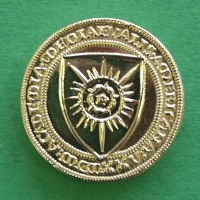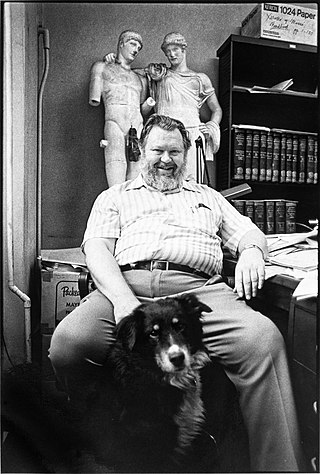Related Research Articles

Piers Plowman or Visio Willelmi de Petro Ploughman is a Middle English allegorical narrative poem by William Langland. It is written in un-rhymed, alliterative verse divided into sections called passus.

Isabella of Hainault was a Queen of France as the first wife of King Philip II. She was also formally ruling Countess of Artois de jure between 1180 and 1190.
Adam Pinkhurst is best known as a fourteenth-century English scribe whom Linne Mooney identified as the 'personal scribe' of Geoffrey Chaucer, although much recent scholarship has cast doubt on this connection.
Pierce the Ploughman's Crede is a medieval alliterative poem of 855 lines, lampooning the four orders of friars.
There are two pseudo-Chaucerian texts called "The Plowman's Tale".
The Piers Plowman tradition is made up of about 14 different poetic and prose works from about the time of John Ball and the Peasants Revolt of 1381 through the reign of Elizabeth I and beyond. All the works feature one or more characters, typically Piers, from William Langland's poem Piers Plowman. Because the Plowman appears in the General Prologue to The Canterbury Tales by Geoffrey Chaucer but does not have his own tale, plowman tales are sometimes used as additions to The Canterbury Tales, or otherwise conflated or associated with Chaucer.
Dame Joan Evans was a British historian of French and English medieval art, especially Early Modern and medieval jewellery. Her notable collection was bequeathed to the Victoria and Albert Museum in London.

The Haskins Medal is an annual medal awarded by the Medieval Academy of America. It is awarded for the production of a distinguished book in the field of medieval studies.
James Simpson is an Australian-British-American medievalist currently serving as the Donald P. and Katherine B. Loker Professor of English at Harvard University.
The Trinity Gower D Scribe, often referred to simply as Scribe D, was a professional scribe and copyist of literary manuscripts active during the late fourteenth and early fifteenth century in London, England. Although his real name long remained unknown, Scribe D has been described as "so well known to students of late Middle English manuscripts that he hardly needs any introduction".
David Roland Aers is a James B. Duke Professor of English, historical theology and religion at Duke University. He has published widely on literature, sacramental culture and ideology in medieval and Renaissance England.
Malcolm Beckwith Parkes, credited as an author as M. B. Parkes, was an English paleographer, notable for his contributions to the scholarship of medieval manuscripts. His studies of the manuscripts of Geoffrey Chaucer and William Langland were especially important, and his 1978 article "The Production of Copies of the 'Canterbury Tales'" was described as "seminal".
Anne Middleton was an American medievalist, and the Florence Green Bixby Professor of English at the University of California, Berkeley.
Dame Rosemary Jean Cramp, was a British archaeologist and academic specialising in the Anglo-Saxons. She was the first female professor appointed at Durham University and was Professor of Archaeology from 1971 to 1990. She served as president of the Society of Antiquaries of London from 2001 to 2004.
Julia Steuart Barrow, is an English historian and academic, who specialises in medieval and ecclesiastical history. Since 2012, she has been Professor in Medieval Studies at the University of Leeds and previously served (2012–16) as the Director of the University's Institute for Medieval Studies.
Nicolette "Nicky" Zeeman is a British literary scholar. She has been Professor of Medieval and Renaissance English at the University of Cambridge since January 2016 and a Fellow of King's College, Cambridge since 1995.
Sebastian Sobecki is a medievalist specialising in English literature, history, and manuscript studies.

Robert Earl Kaske was an American professor of medieval literature. He spent most of his career at Cornell University in Ithaca, New York, where he was the Avalon Foundation Professor in the Humanities, and where he founded one of the preeminent medieval studies graduate programs in North America. His published output included lengthy interpretations of Beowulf, and of poems and passages by Dante and Chaucer, and frequently constituted leading studies. Kaske particularly enjoyed solving cruxes, with articles on problematic passages in works such as Pearl, Piers Plowman, the Divine Comedy, "The Husband's Message", "The Descent into Hell", and Beowulf.
Griffin Murray is an Irish archaeologist and art historian specialising in medieval Ireland and Insular art–especially metalwork–in the period between 400–1550 AD. His interests include identifying and contextualizing the social role of medieval craftsmen, Viking art and the relations between insular and Scandinavian craftsmen, and he is a leading expert on both house-shaped shrines and insular croziers.
"Y Llafurwr", known in English as "The Ploughman" or "The Labourer", is a poem in the form of a cywydd by the 14th-century Welsh poet Iolo Goch. Often compared with William Langland's Middle English Piers Plowman, it presents a sympathetic portrayal of the meek and godly ploughman; no other Welsh bardic poem takes an ordinary working man as its subject. It has been called the most notable of Iolo's poems, comparable with the finest works of Dafydd ap Gwilym, and its popularity in the Middle Ages can be judged from the fact that it survives in seventy-five manuscripts. It is included in The Oxford Book of Welsh Verse.
References
- ↑ "Kathryn Kerby-Fulton". University of Notre Dame. Retrieved 20 December 2019.
- ↑ kerby-Fulton, K. (1986). The voice of honest indignation : A study of reformist apocalypticism in relation to Piers Plowman (Thesis). University of York.
- 1 2 "PAST VISITOR-Kathryn Kerby-Fulton". Institute of Advanced Studies. 9 December 2019. Retrieved 20 December 2019.
- ↑ "Recent Recipients of the John Nicholas Brown Prize". Medieval Academy of America. Retrieved 20 December 2019.
- ↑ "5 December Ballot Result". Society of Antiquaries of London. 5 December 2019. Retrieved 20 December 2019.